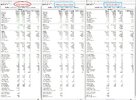- Joined
- 20 July 2021
- Posts
- 12,947
- Reactions
- 17,953
one would suspect the growing popularity of AI trending toward evolutionary with all those potential flaws or enhancementsOr is now an evolutionary system falling within the definition of 'mechanical'?








